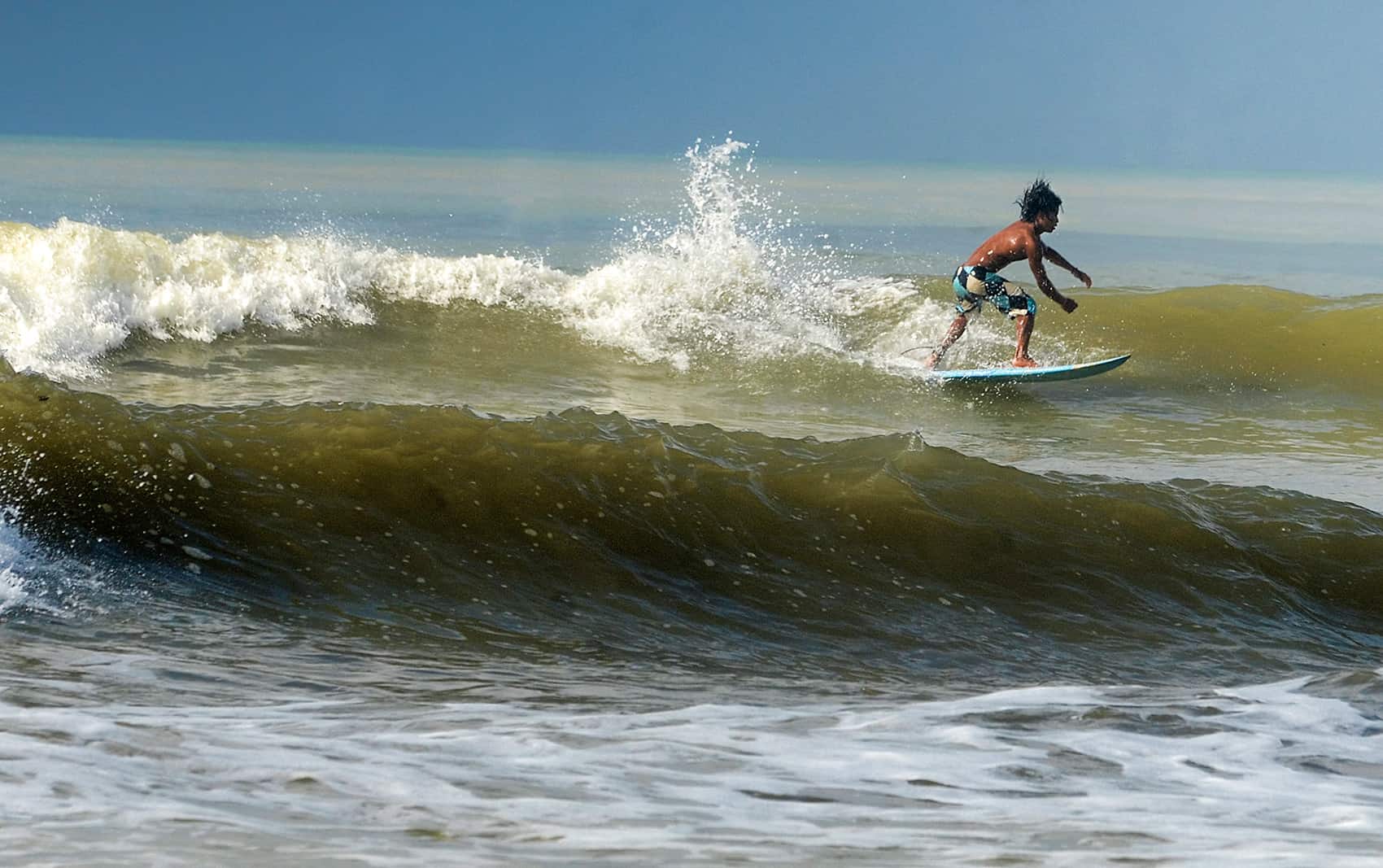The typical Costa Rican tourist walks off the airplane equipped with a fairly predictable to-do list. A zip-line tour usually breaks the top 10, along with something related to monkeys or toucans, and for beach-going Gringos, surfing is almost certainly somewhere on the itinerary.
What many tourists don’t realize is, unlike a lot of other activities, surfing is hard.
“To really learn you have got to be dedicated,” said Justin Hague, owner of El Tubo Surf in Dominical. “Most tourists just come to try it once and have their pictures taken.”
Located right off of the beach in Dominical, El Tubo is a prime spot for tourists to rent a board or buy a lesson on a whim. In fact, directly following his explanation of the casual surfer phenomenon, Justin got a typical customer – a tube-sock-clad Gringo who immediately requested a board “for someone who has never surfed before.” Did he want a lesson? Nah.
Fortunately for tube-sock guy and the hordes of other travelers flooding Costa Rica’s beaches, local surf shops and schools are chalk full of gear for people who have never surfed before.
Dominical is no different, and at the beginning of surf season, local businesses are banking on the continued novelty of surfing. “You couldn’t get a better place or a better time for beginners than right now in Dominical,” said Jason Butler, owner of Green Iguana, the oldest surf school and camp in the area. “The waves are smaller and well-shaped. This is about as good as it gets.”
Dominical is home to some of Costa Rica’s most consistent waves, and while the white-water breaks are perfect for beginners, the bigger swells are legendary amongst advanced surfers.
Despite its reputation, Dominical has not seen the same type of development that many other Costa Rican beach towns are now known for. With its dirt roads and lack of high-rise hotels, Dominical is one of the old-school surf scene’s last bastions, but locals have definitely seen a change in the sleepy beach town.
“What has changed is that there are a lot more people in town, more competition,” said Butler. “It has gotten to the point where people are charging $40 a lesson just to make ends meet.”
Looking to cash in on the tourist surf scene, new schools crop up every year and undercut the competition. Dominical is now one of the cheapest places to surf in Costa Rica, with prices in Jacó and Quepos hovering closer to $60 for an hour-long private lesson, at the cheapest.
The price drops have added to the woes of some of the area’s long-standing surf schools, which have been hurting since the recession hit Costa Rica in 2008. According to Butler, this season isn’t looking any better for tourism.
“The streets are dead right now, and I don’t know why,” Butler said. “It looks like the high season here is going to be kind of a short one.”
Fear of failing does not seem to be a concern for up-and-coming surf school owners in Dominical, and there is a constant stream of new businesses at the beginning of each high season.
“Every year some surf schools pop up and some disappear,” Hague said. “There are usually somewhere between ten and 20 schools in town.”
In an industry that caters to the uneducated tourist, Dominical surf schools can do little to distinguish themselves other than lowering their prices.
“There are too many of the exact same businesses,” said Nego Mora, a Dominical native and former Costa Rican surfing champion. “People keep coming in and they don’t know what they’re doing.”
Bitter by self-admission, Butler claims many of these school owners got their start working for him, and that their spin-off businesses do little to help the quality of the industry. They simply drive prices into the ground.
“Back in 2005, there was no haggling,” he said. “Now if it comes down to $2 or $3 being saved, people will go to the next guy down the road. It doesn’t matter that I have a longtime, quality business.”
This year the new kid on the block is the Tico Surf School, run by cousins Jordy, 16, and Caleb Mendez, 18. Born and raised in Dominical, the two Ticos grew up surfing and hope to make a future in the industry.
While the cousins have significant surfing experience, they are self-taught instructors with limited English skills.
“People try to help us out because we are so young,” Caleb said. “Sometimes people know more than us, but they help us and we are learning.”
The Mendez cousins said that they were pulled into the surfing business because of a deep love for the sport, but their inexperience is typical of new businesses in the area.
“People come out here to do this just to live the lifestyle,” said Butler. “This is very typical of why we are hurting.”
Obstacles aside, the cousins seem determine to make their business work, and have high hopes that a surf school will be a permanent fixture in their futures.
“To see someone that you taught get up on the board is the best feeling in the world for us,” Jordy said.

